10 Advantages and disadvantages of Internet – With Examples
Published: 6 Aug 2025
Is the internet making our lives better or worse? Some people say it’s the best invention ever, while others believe it causes many problems. To help you decide, let’s look at the 10 advantages and disadvantages of the internet and see both the good and bad sides. To stay protected while using the internet, don’t forget to check our 25 Internet Safety Tips.
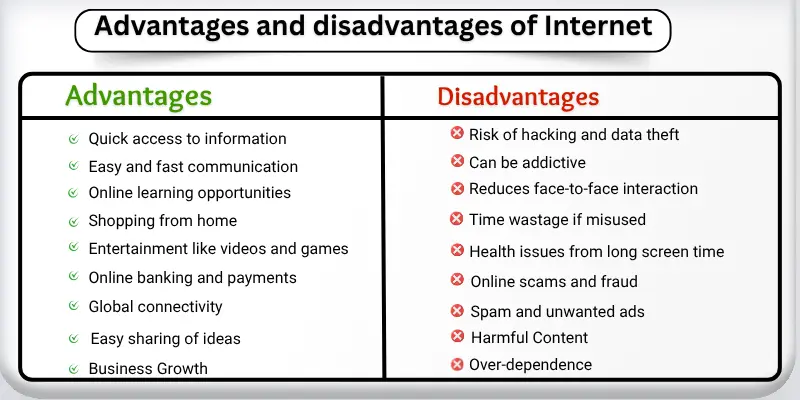
What are the 10 Advantages and Disadvantages of Internet?
Advantages are the good points of the internet, like helping us study or talk to friends. Disadvantages are the bad points, like wasting time or harmful content. Now, let’s explore the 10 advantages and disadvantages of the internet in detail.
10 Advantages of Internet
The internet has many benefits that make our lives easier and more enjoyable. Here are 10 advantages of the internet:
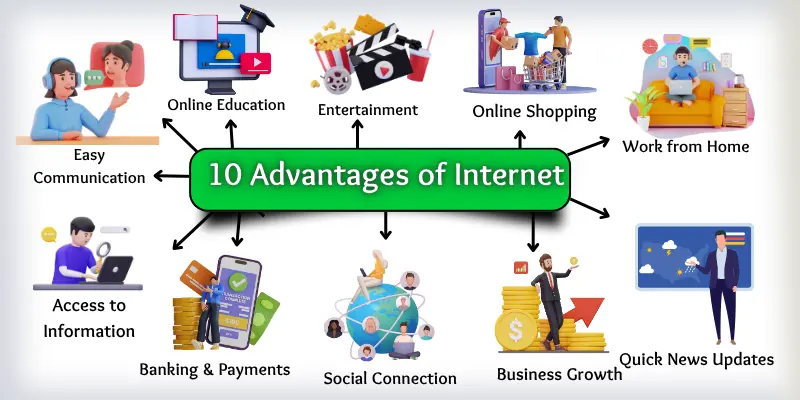
- Easy Communication
- Access to Information
- Online Education
- Entertainment
- Online Shopping
- Work from Home
- Banking & Payments
- Social Connection
- Quick News Updates
- Business Growth
Easy Communication
The internet helps people talk to each other anywhere in the world. You can send a message or make a video call in seconds. It is fast and simple. It keeps friends and family close, even if they live far away. We use many tools for communication that cannot work without the internet, such as:
- WhatsApp: Send messages, pictures, and videos.
- Zoom: Join meetings or attend online classes.
- Skype: Make video and voice calls.
- Facebook Messenger: Chat with friends online.
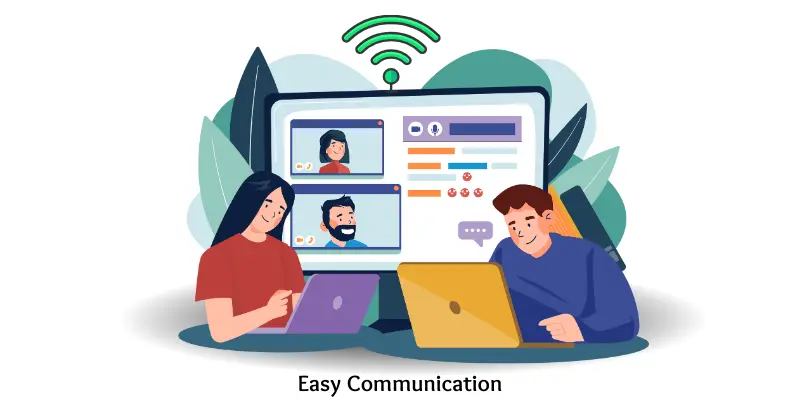
Access to Information
The internet gives us information on any topic. You can search for school homework, news, or how-to guides. It is quick and simple. With just a few clicks, you can find what you need. Many websites and apps help us get the right information, such as:
- Google: Search for answers on any topic.
- Wikipedia: Read facts and history.
- YouTube: Watch lessons and tutorials.
- BBC News: Learn about news and events.
Online Education
The internet helps us study from home. You can attend classes on your computer or phone. It is simple and fast. Students can learn anytime and anywhere. Many platforms help us study better, such as:
- Khan Academy: Learn different subjects for free.
- Coursera: Take online courses from universities.
- Duolingo: Learn new languages in a fun way.
- Quizlet: Practice with flashcards and quizzes
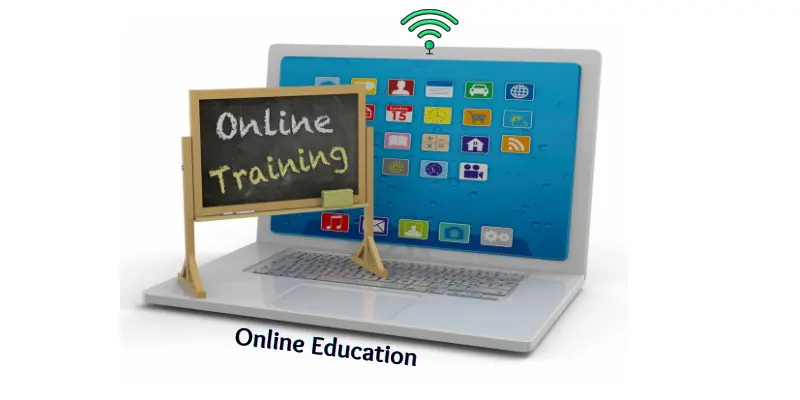
Entertainment
The internet gives us many ways to have fun. We can watch movies or listen to songs. We can play games online with friends. It is easy and fast. Many websites and apps give us entertainment, such as:
- Netflix: Watch movies and TV shows.
- Spotify: Listen to songs and podcasts.
- Roblox: Play games and create your own world.
- Disney: Watch cartoons and family movies.
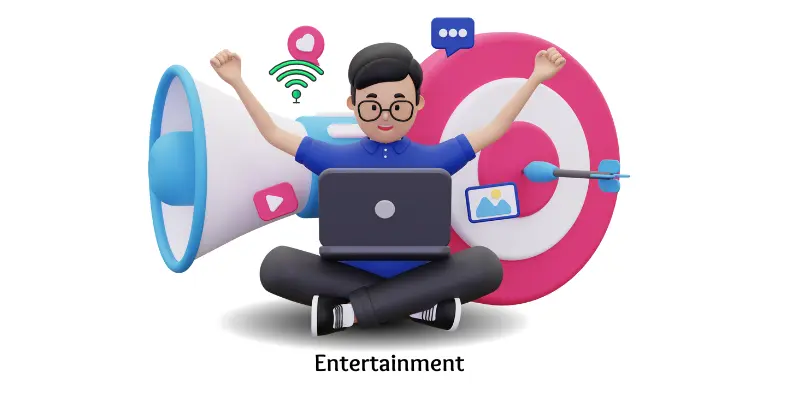
Online Shopping
The internet lets us buy things from home. We can choose clothes, books, or food. It saves time and energy. We get products at our doorstep. Many websites help us shop easily, such as:
- Amazon: Buy almost anything online.
- Daraz: Shop for clothes, electronics, and more.
- eBay: Purchase items from different countries.
- AliExpress: Order products at low prices.
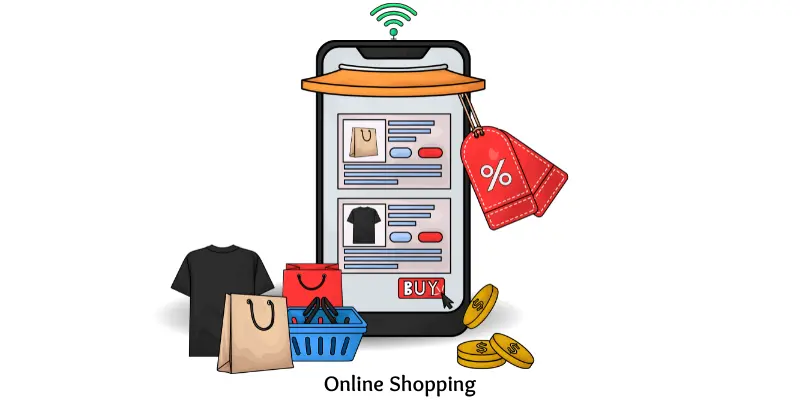
Work from Home
The internet helps people do jobs from home. They can send work to the office online. They can join meetings on their computer or phone. It saves travel time. Many tools make working from home simple, such as:
- Google Meet: Join video meetings.
- Trello: Organize tasks and projects.
- Slack: Chat with your work team.
- Asana: Plan and track your work.
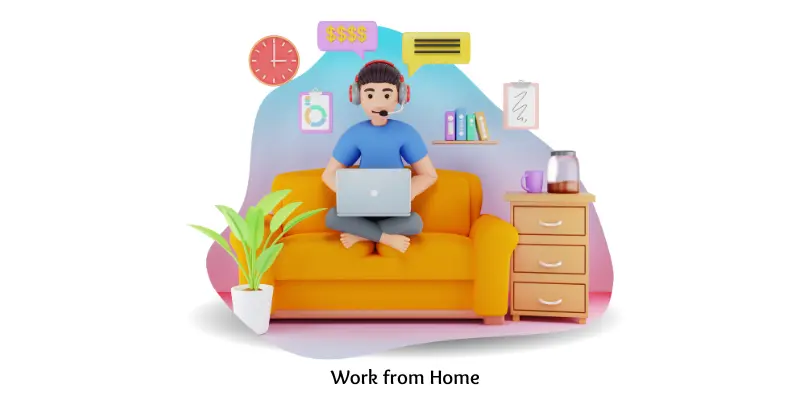
Banking & Payments
The internet makes banking easy. We can send and receive money online. We can pay bills without going to the bank. It is fast and safe if we use trusted apps. Many services help us manage money, such as:
- PayPal: Send and receive money worldwide.
- Easypaisa: Pay bills and transfer money in Pakistan.
- JazzCash: Send money and recharge mobile balance.
- Wise: Transfer money to other countries at low cost.
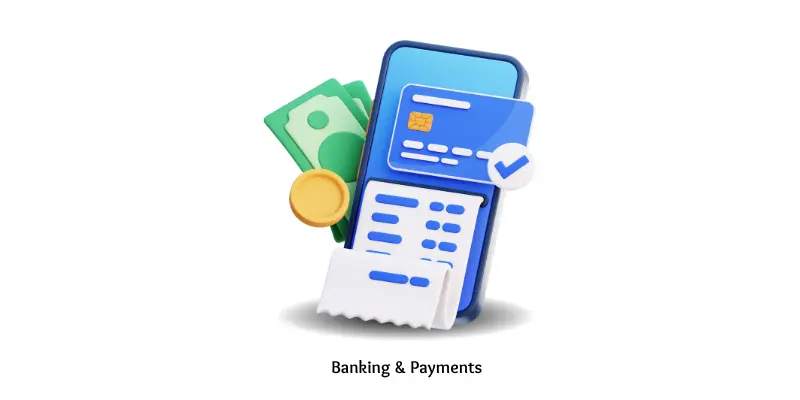
Social Connection
The internet helps us stay connected with people. We can share photos and stories. We can join groups and meet new friends. It makes the world feel smaller. Many apps help us connect, such as:
- Instagram: Share pictures and videos.
- Twitter (X): Post short messages and follow news.
- TikTok: Watch and create short videos.
- LinkedIn: Connect with people for job and career opportunities.
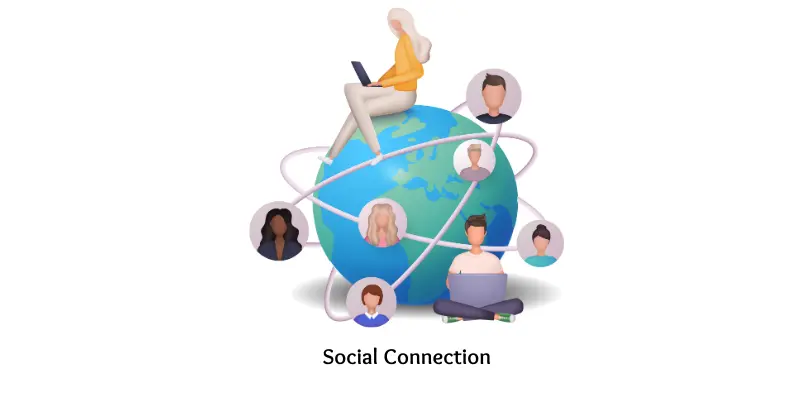
Quick News Updates
The internet gives us news in seconds. We can read about events from anywhere in the world. We can watch live updates. It is faster than newspapers. Many sites and apps give news, such as:
- CNN: News from around the world.
- Geo News: News and updates in Pakistan.
- Al Jazeera: International news and reports.
- Dawn: Pakistani news and articles.
Business Growth
The internet helps businesses grow fast. They can sell products online. They can reach customers in other cities or countries. It costs less than opening many shops. Many platforms help businesses grow, such as:
- Shopify: Create an online store.
- Etsy: Sell handmade and unique items.
- Fiverr: Offer services and find clients.
- Upwork: Work with clients from around the world.
10 Disadvantages of Internet
The internet is very useful, but it also has some problems. Here are the 10 disadvantages of the internet.
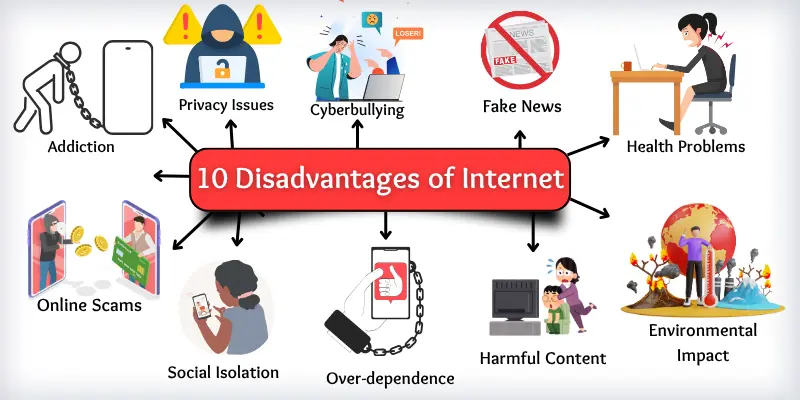
- Addiction
- Privacy Issues
- Cyberbullying
- Fake News
- Health Problems
- Online Scams
- Social Isolation
- Over-dependence
- Harmful Content
- Environmental Impact
Addiction
The internet can make people spend too much time online. They forget to study or play outside. It can harm health athe nd mind. Many things can cause addiction, such as:
- Online games: Play for many hours without breaks.
- Social media: Scroll for a long time without noticing time.
- Video streaming: Watch movies or shows all day.
- Chat apps: Keep chatting instead of doing important work.
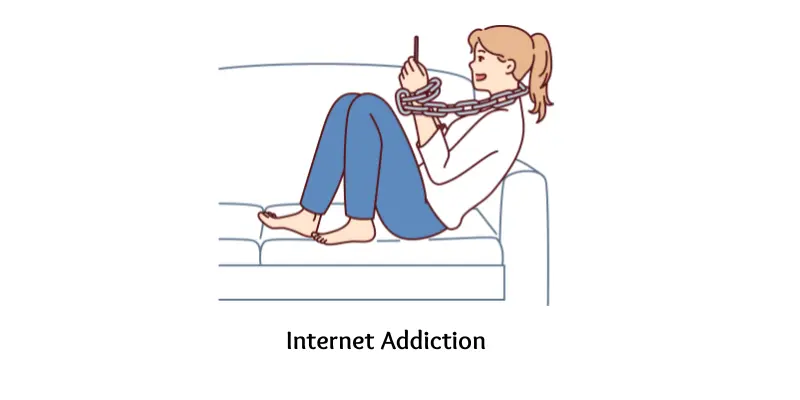
Privacy Issues
The internet can put our personal data at risk. Hackers can steal information. Strangers can see what we share online. This can be dangerous. Some common risks include:
- Data hacking: Stealing passwords and files.
- Phishing emails: Fake messages asking for personal info.
- Public Wi-Fi: Unsafe networks that leak data.
- Tracking cookies: Websites track your online activity.
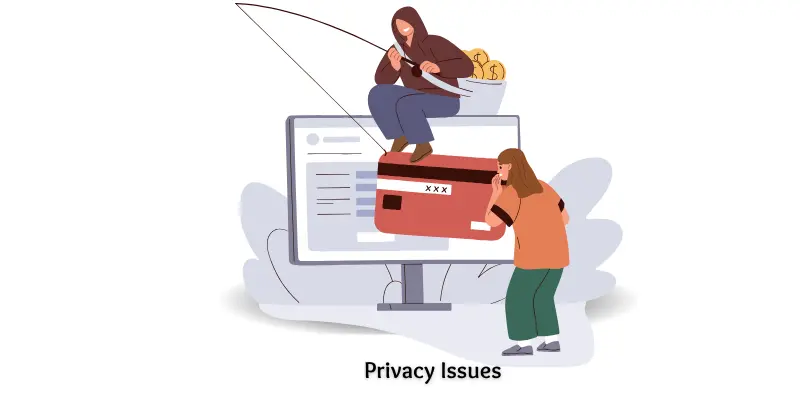
Cyberbullying
The internet can be used to hurt others. Some people send mean messages. Others post bad pictures or lies. It can make people feel sad and scared. Common places where cyberbullying happens are:
- Social media: Posting rude comments or pictures.
- Messaging apps: Sending hurtful or threatening texts.
- Online games: Using bad words or bullying players.
- Forums: Spreading lies about someone.
Fake News
The internet can spread wrong information. People may believe it without checking. It can cause fear or confusion. Fake news can appear in many places, such as:
- Clickbait websites: Share false stories for views.
- Social media posts: Spread unverified news quickly.
- Fake videos: Show edited or wrong clips.
- Chain messages: Send untrue stories in groups.
Health Problems
Spending long hours on the internet can harm our health. It can hurt our eyes and body. It can also affect our sleep. Common health problems include:
- Eye strain: Looking at screens for too long.
- Back pain: Sitting in one position for hours.
- Poor sleep: Using devices late at night.
- Headaches: Caused by too much screen time.
Online Scams
The internet is full of fake offers and scams. Scammers trick people into giving them their money or data. They pretend to be real. Some common scams include:
- Phishing websites: Fake sites asking for passwords.
- Lottery emails: Claim you won a prize you never entered.
- Fake shopping sites: Take money but send nothing.
- Job scams: Request payment before providing work.
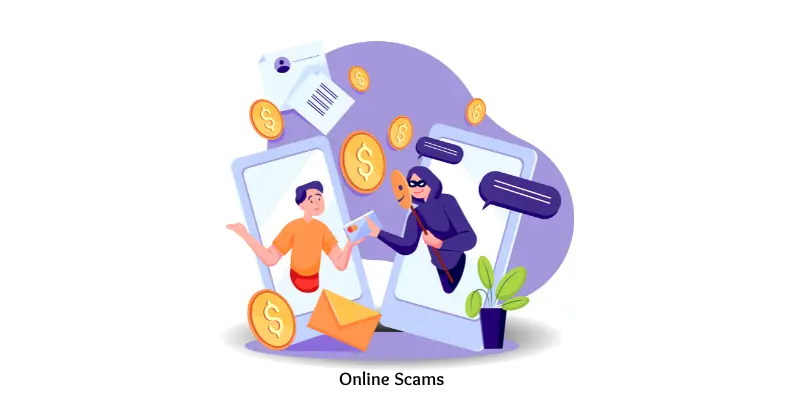
Social Isolation
The internet can make people spend less time with family and friends. They may choose to stay online instead of meeting in person. It can make people feel lonely. Common reasons for social isolation include:
- Online games: Playing for hours alone.
- Binge-watching: Watching shows without breaks.
- Endless scrolling: Spending too much time on social media.
- Online chatting: Talking online instead of face-to-face.
Over-dependence
The internet can make people dependent on it for everything. They may not try to think or solve problems on their own. It can make skills weaker. Examples of over-dependence include:
- Online maps: Using them even for short trips.
- Spell checkers: Relying on them instead of learning spelling.
- Search engines: Looking up answers without trying first.
- Translation apps: Using them instead of learning the language.
Harmful Content
The internet has some content that is not good for children or teenagers. It can show violence or other bad things. It can affect thoughts and behaviour. Common types of harmful content include:
- Violent videos: Show fights or depict people being hurt.
- Adult websites: Show content not safe for kids.
- Hate speech: Words that spread anger or hate.
- Dangerous challenges: Online trends that can cause harm.
Environmental Impact
The internet uses a lot of electricity. Data centers run all day and night. It makes more carbon in the air. It can harm nature. Common causes of the internet’s environmental impact include:
- Large data centers: Use big machines that need power.
- Streaming videos: Requires a lot of energy to run.
- Online ads: Load extra data on websites.
- Unused emails: Stored on servers and waste space.
Conclusion
Okay, guys, it’s time to finish up! In this article, we’ve covered 10 Advantages and Disadvantages of Internet in detail. The internet can be a great friend if we use it for learning, work, and staying connected. But it can also cause problems if we spend too much time online. My advice is to use the internet wisely and take breaks to enjoy the real world. If you found this article helpful, share it with your friends and leave a comment below.
FAQS about the Advantages and Disadvantages of the Internet
Here are some queries about the Advantages and Disadvantages of Internet.
The internet enables us to communicate, find information, and complete daily tasks more efficiently. Many services, such as online banking, shopping, and learning, depend on it. Without the internet, life would be slower and less connected.
It allows instant communication, easy access to information, and online learning. You can also shop, watch videos, and share your ideas. It saves time and connects you to the world.
It can be addictive and reduce face‑to‑face interactions. Some information online is false or unsafe. There is also a risk of hacking and privacy loss.
Do not share personal information with strangers. Visit only trusted websites. Use strong passwords and update your devices regularly.
Yes, there are many free and paid courses online. You can watch videos, join classes, and read guides to improve your skills. The internet makes learning possible from anywhere
Close the website or app immediately. Tell a parent, teacher, or trusted adult. Report harmful content so others can stay safe too.
Search for educational websites and watch learning videos. Join online classes and use digital libraries for research. Take notes while studying to remember more.
Plan offline activities, such as reading, sports, or spending time with friends and family. Keep devices away when it’s time to sleep or study. Take regular breaks from screens.
Use parental control settings on devices. Teach children not to talk to strangers online. Monitor the websites and apps they use.
Look for sites that use “https” in the address. Check if they are run by well‑known companies or organizations. Read reviews from other users

- Be Respectful
- Stay Relevant
- Stay Positive
- True Feedback
- Encourage Discussion
- Avoid Spamming
- No Fake News
- Don't Copy-Paste
- No Personal Attacks

- Be Respectful
- Stay Relevant
- Stay Positive
- True Feedback
- Encourage Discussion
- Avoid Spamming
- No Fake News
- Don't Copy-Paste
- No Personal Attacks
